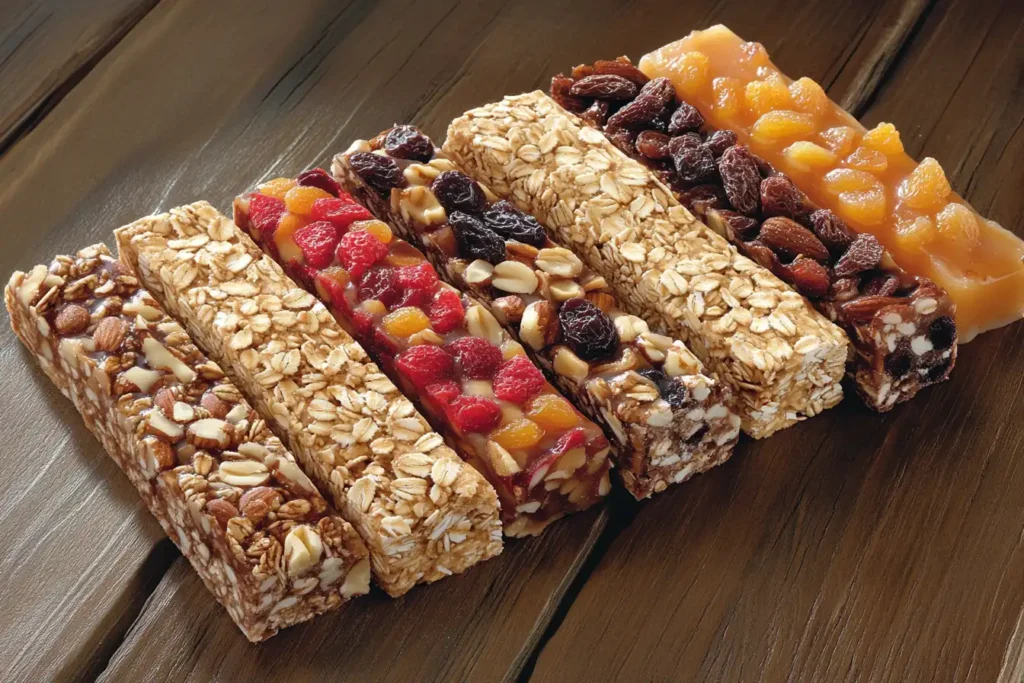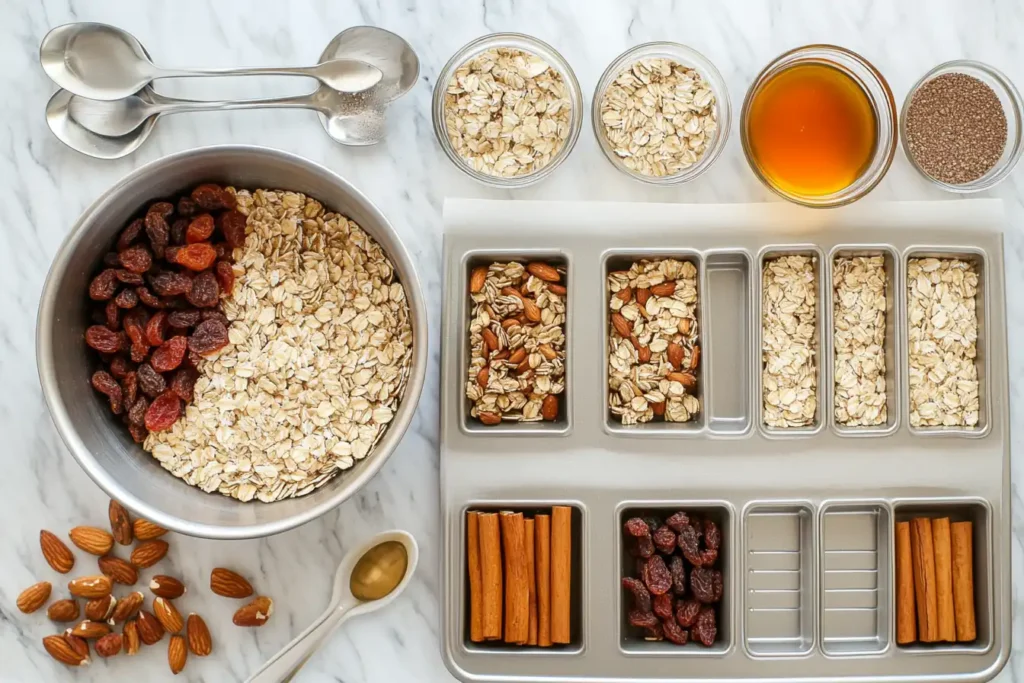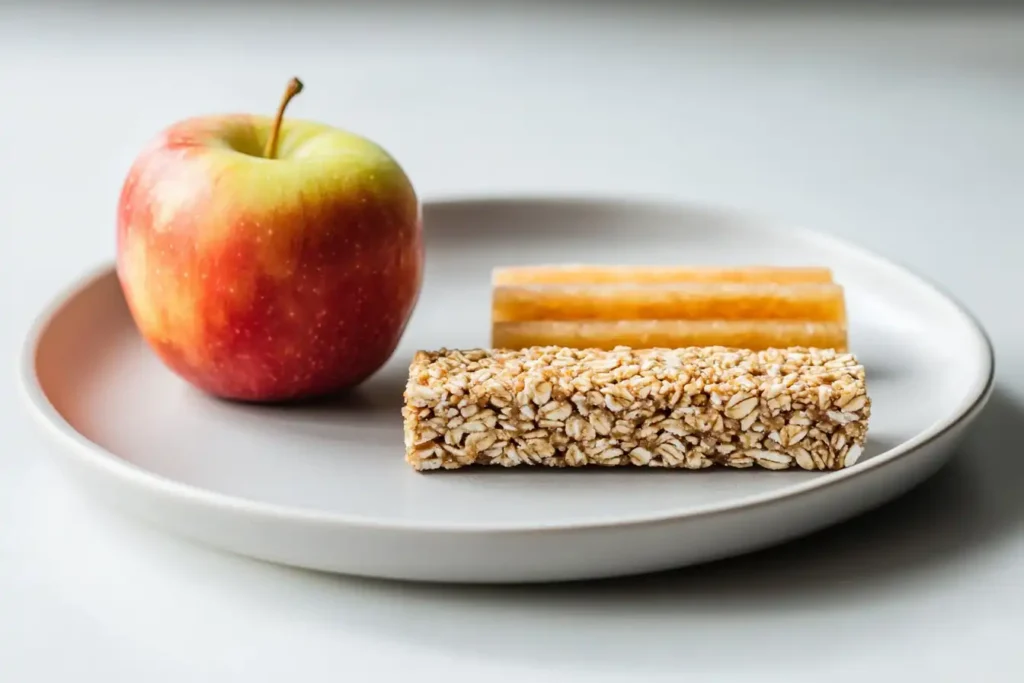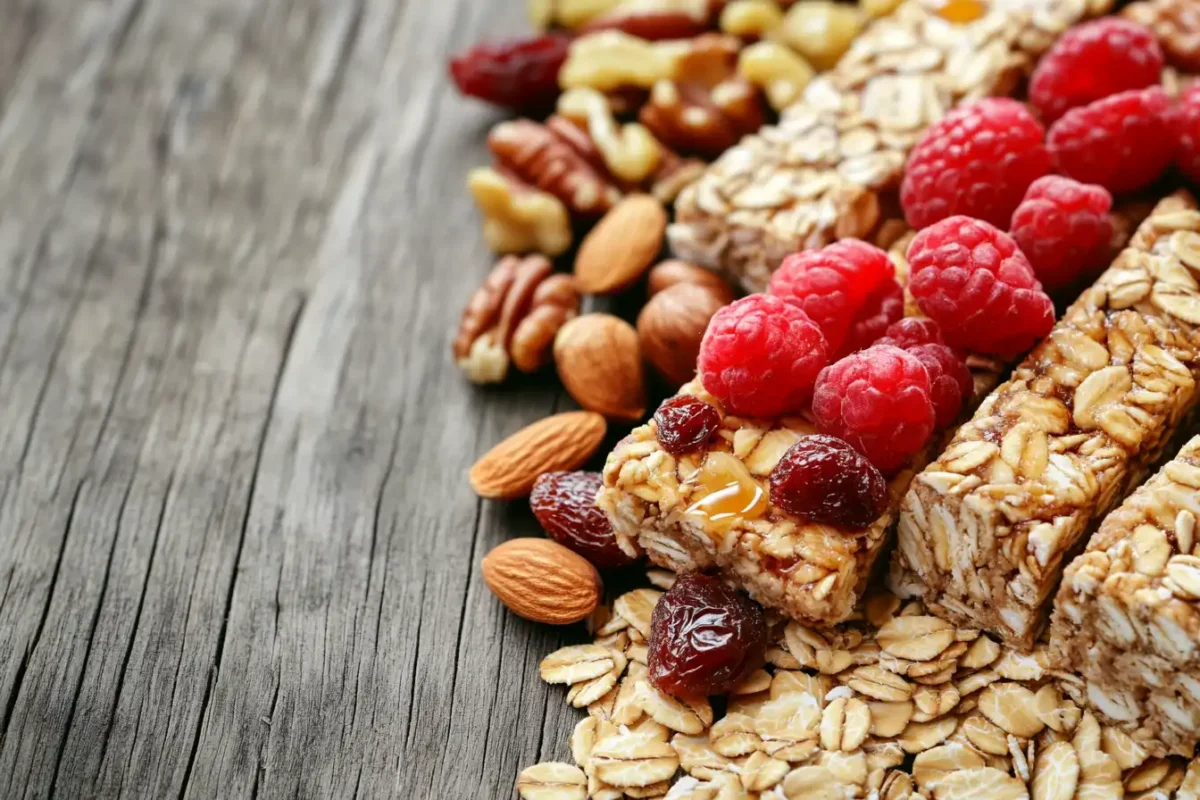Granola bars are a go-to snack for many, offering convenience, portability, and a seemingly healthy option for busy lifestyles. But how healthy are they? This article dives into the world of granola bars to uncover their nutritional benefits, potential drawbacks, and how to choose the best ones for your health. We’ll also explore whether they fit into various diets, how they compare to other snacks, and even share tips for making your own. So, let’s peel back the wrapper and see if granola bars truly deserve their health halo.
What Are Granola Bars?
Granola bars have become a staple snack for those on the go. But what exactly are they, and how did they gain such widespread popularity? Let’s take a closer look.
Definition and History of Granola Bars
Granola bars are a compact snack made from oats, nuts, seeds, dried fruits, and sweeteners, bound together into a convenient bar shape. Originally derived from granola cereal, they were designed to provide a quick, nutritious energy boost. The first granola bar appeared in the 1970s and quickly gained traction for being portable, tasty, and marketed as a healthy snack.
Common Ingredients in Granola Bars
The basic components of granola bars include rolled oats, honey or syrup, nuts like almonds or peanuts, and dried fruits such as raisins or cranberries. Some bars also incorporate chocolate chips, protein powders, or seeds like chia and flax for added nutritional benefits. However, not all ingredients are as healthy as they seem—watch out for hidden sugars and artificial additives.
Why Granola Bars Became Popular?
The rise in demand for healthy snacks coincided with busy lifestyles, making granola bars the perfect solution. Their long shelf life and versatility made them a favorite for hikers, students, and anyone needing a quick bite. Today, they’re available in countless flavors and variations, catering to diverse dietary needs and preferences.
Nutritional Profile of Granola Bars
When considering whether granola bars are healthy, understanding their nutritional profile is crucial. While they’re often marketed as wholesome, their actual benefits depend on the ingredients and preparation methods.
Calories, Protein, and Macronutrient Composition
Granola bars typically range from 100 to 300 calories per serving, depending on the size and ingredients. They provide carbohydrates from oats and sweeteners, fats from nuts, and sometimes proteins from added powders or seeds. However, the balance of these macronutrients varies significantly between brands and recipes. High-calorie bars may be less suitable for weight-conscious individuals unless balanced with physical activity.
Micronutrients in Granola Bars: Are They Beneficial?
Some granola bars are fortified with vitamins and minerals like iron, calcium, and vitamin D, offering a nutritional boost. Bars with ingredients like dried fruits and seeds also add antioxidants and fiber. However, overprocessed bars may lose these natural benefits, leaving behind empty calories.
Hidden Sugars and Additives in Granola Bars
One of the main concerns with granola bars is their sugar content. Many contain added sugars, such as high fructose corn syrup, honey, or syrups, which can contribute to unhealthy blood sugar spikes. Additionally, some bars include artificial preservatives or flavors, which might reduce their appeal as a truly healthy snack.
If you’re considering making your own granola bars, you might want to explore some DIY granola recipes for a healthier, customizable option. Check out this guide to making healthier snacks at home for inspiration.
Health Benefits of Granola Bars

Despite their drawbacks, granola bars offer several benefits, especially for those who choose wisely. Here’s how they can fit into a healthy lifestyle.
Are Granola Bars Good for Weight Management?
Granola bars, particularly those high in fiber and protein, can be an excellent tool for controlling hunger. They help you stay full between meals, potentially reducing overeating. Opting for bars with natural sweeteners and minimal saturated fats can further support weight goals.
Energy and Convenience: A Quick Snack Option
Granola bars shine as a convenient snack. They’re easy to carry, require no preparation, and provide a quick energy boost, making them ideal for busy mornings or pre-workout fuel. The combination of carbs and proteins can stabilize energy levels, though it’s essential to avoid those with excessive sugars to prevent crashes.
Supporting Digestive Health with Fiber
High-fiber granola bars can promote gut health by aiding digestion and preventing constipation. Ingredients like oats, flaxseeds, and dried fruits contribute soluble and insoluble fibers, which are essential for a balanced diet.
When choosing granola bars, selecting those with natural, whole ingredients is key to reaping these benefits. Look for bars labeled “high in fiber” or “low in sugar” to maximize their health potential.
Potential Drawbacks of Granola Bars
While granola bars can offer numerous benefits, not all options are created equal. Some types can have significant downsides, especially for those aiming for a truly healthy diet. Let’s unpack the potential drawbacks of granola bars.
Excessive Sugar Content and Its Risks
One of the most common issues with granola bars is their high sugar content. Many brands use refined sugars, syrups, or artificial sweeteners to enhance flavor, which can lead to unhealthy spikes in blood sugar levels. Over time, consuming too much added sugar may contribute to weight gain, diabetes, and heart disease. Always check the label for hidden sugars, even in bars marketed as “low-fat” or “healthy.”
Overconsumption and Portion Control
Granola bars are easy to overconsume. Their compact size can make it tempting to grab another when one doesn’t seem satisfying. However, many are calorie-dense, and eating multiple bars can easily exceed your daily caloric needs. To avoid this, pair a granola bar with a nutrient-rich side, like a piece of fruit or a handful of raw nuts.
Artificial Ingredients and Preservatives
Not all granola bars are made with whole ingredients. Some are packed with artificial flavors, colors, and preservatives to improve shelf life or mimic a homemade taste. These additives may offer little to no nutritional value and could potentially harm long-term health.
If you’re looking to avoid these pitfalls, consider exploring more natural snack alternatives. For more wholesome snack ideas, check out our ultimate granola bar guide on My Magic Recipes.
How to Choose a Healthy Granola Bar?
Choosing the right granola bar can be overwhelming with so many options available. To ensure you’re making a healthy choice, keep the following tips in mind.
Reading the Nutrition Label
Always start by reviewing the nutrition label. Look for bars that contain less than 10 grams of sugar and more than 3 grams of fiber per serving. Avoid those with trans fats or ingredients you can’t pronounce, as these are often indicators of heavily processed foods.
Spotting Healthy Ingredients
The healthiest granola bars are made from whole, natural ingredients like oats, nuts, seeds, and dried fruits. Opt for bars that list these items first, as ingredient lists are arranged by quantity. Bars with minimal ingredients are often a safer bet for a healthier snack.
Avoiding Unhealthy Additives and Sugars
Check for artificial additives or excessive sweeteners. Natural sweeteners like honey or maple syrup are better alternatives to refined sugar, but even these should be consumed in moderation. If you spot hydrogenated oils or high fructose corn syrup, it’s best to steer clear.
By keeping these tips in mind, you can confidently answer the question, Is granola bar healthy? Yes, it can be—as long as you choose wisely and eat in moderation.
For more snack inspiration or a deeper dive into crafting your own healthy treats, check out My Magic Recipes’ granola bar recipes for ideas you can try today.
DIY Homemade Granola Bars

If you’ve ever wondered if a granola bar is healthy when purchased off the shelf, making your own could be the solution. Homemade granola bars give you control over ingredients, ensuring a snack that’s both nutritious and delicious.
Benefits of Making Granola Bars at Home
Crafting granola bars at home allows you to tailor the recipe to your dietary needs. You can skip the artificial preservatives and focus on whole, natural ingredients. Homemade bars are also cost-effective, saving you money compared to buying premium brands.
Another major benefit is customization. Prefer more fiber? Add chia seeds or flaxseeds. Looking to reduce sugar? Use natural sweeteners like honey sparingly or skip them altogether.
Easy and Healthy Recipes
Creating homemade granola bars is simpler than you might think. Start with a base of rolled oats, mix in nuts, seeds, and dried fruits, and bind them with a natural ingredient like peanut butter or mashed bananas. Bake or refrigerate until firm, and you’re ready to go.
For a more indulgent touch, try adding dark chocolate chips or a drizzle of melted dark chocolate. These recipes can be adjusted endlessly to suit your taste and nutritional goals.
Customizing Granola Bars to Meet Your Dietary Needs
Homemade granola bars cater to a wide range of diets. You can make them gluten-free by using certified gluten-free oats or vegan by swapping honey for maple syrup. Adding plant-based protein powders can make them ideal for athletes.
Crafting your own bars also lets you answer the question, is granola bar healthy for you? With the right ingredients, the answer is a definite yes.
Are Granola Bars Healthy for Specific Diets?

Granola bars can be a versatile snack, but their health largely depends on the type of diet you follow. Let’s examine how they fit into different dietary lifestyles.
Granola Bars for Weight Loss Diets
For those focusing on weight management, granola bars can be a helpful addition—when chosen wisely. Look for bars high in fiber and protein but low in sugar. These types of bars can curb hunger without adding empty calories. Homemade versions with minimal sweeteners are even better for keeping calorie counts low.
Suitability for Vegan and Gluten-Free Diets
Many granola bars cater to vegans and those with gluten sensitivities. Vegan-friendly bars typically avoid dairy and honey, while gluten-free options use certified oats. Always double-check ingredient labels or recipes to ensure compliance with your dietary needs.
Granola Bars for Athletes and High-Performance Diets
Athletes often turn to granola bars for quick energy and recovery. For active individuals, bars with added protein and complex carbohydrates can provide sustained energy. Ingredients like nuts, seeds, and dried fruits are excellent for fueling intense workouts or recovering afterward.
Whether you’re a casual snacker or following a strict diet, granola bars can adapt to fit your lifestyle. The key to answering is granola bar healthy lies in picking or creating the right ones for your goals.
Part 8: Granola Bars in Comparison to Other Snacks
Granola bars are often touted as a healthier alternative to other snacks. But how do they really stack up? Let’s explore how granola bars compare to popular snack options.
Granola Bars vs. Protein Bars: What’s Better?
Protein bars are formulated to provide a higher protein content, often aimed at athletes or those looking to build muscle. While granola bars typically focus on being a balanced energy source, many fall short in protein compared to their counterparts. However, granola bars often have fewer artificial ingredients and lower calorie counts.
The choice between the two depends on your needs. If you’re looking for a post-workout snack, a protein bar may be better. For casual snacking or quick energy, granola bars can shine. But remember, when wondering is a granola bar healthy, the answer lies in the specific bar you choose.
Comparing Granola Bars to Fruits and Whole Foods
Whole foods like fruits, nuts, and vegetables are unprocessed and packed with nutrients. While granola bars can be nutritious, they’re often more processed and may contain added sugars or preservatives. For a natural, no-fuss option, whole foods are hard to beat.
That said, granola bars are more convenient and portable, making them a practical choice for busy days. Pairing a granola bar with fresh fruit can offer the best of both worlds—quick energy and a nutrient boost.
FAQs About Granola Bars
Are Granola Bars Good for Weight Loss?
Granola bars can support weight loss if chosen wisely. Look for options high in fiber and protein, as they help keep you full longer. Avoid bars with excessive sugar or unhealthy fats, as they can add unnecessary calories. Homemade bars can also be tailored to suit your goals.
Can Granola Bars Replace a Meal?
While granola bars are a great snack, they’re usually not a sufficient meal replacement. Most lack the necessary balance of macronutrients, particularly protein and healthy fats, to keep you full for an extended period. For a more complete meal, pair a granola bar with a serving of yogurt or a smoothie.
How Many Granola Bars Can You Eat in a Day?
It’s best to limit granola bar consumption to one or two per day. Overeating them can lead to excess calorie and sugar intake, negating their potential benefits. Keep portion sizes in check and combine bars with whole foods for a balanced diet.
Whether you’re snacking for convenience or looking for health benefits, granola bars can fit into most diets. Asking if granola bars are healthy is a great start to making better choices.
Conclusion:
Granola bars can undoubtedly be a convenient and nutritious snack, but their overall healthiness largely depends on the ingredients and how they fit into your diet. For instance, choosing bars with minimal added sugars, high fiber content, and whole, natural ingredients ensures they become a valuable addition to your daily routine. Moreover, granola bars can work well for those managing weight, seeking a quick energy boost, or catering to specific dietary needs.
However, it’s important to remember that not all granola bars are created equal. Many contain hidden sugars or artificial additives, which can undermine their health benefits. Therefore, if you’re still asking, is a granola bar healthy? The answer is: yes, but only when you make informed choices or prepare homemade versions that suit your preferences.
Ultimately, balance is essential. Pair granola bars with other whole foods, such as fresh fruits or yogurt, for a well-rounded snack. Additionally, don’t shy away from experimenting—try new recipes, explore healthier options, or even create your granola bar masterpiece. By doing so, you can enjoy a tasty, nutritious snack that truly supports your health goals.!

